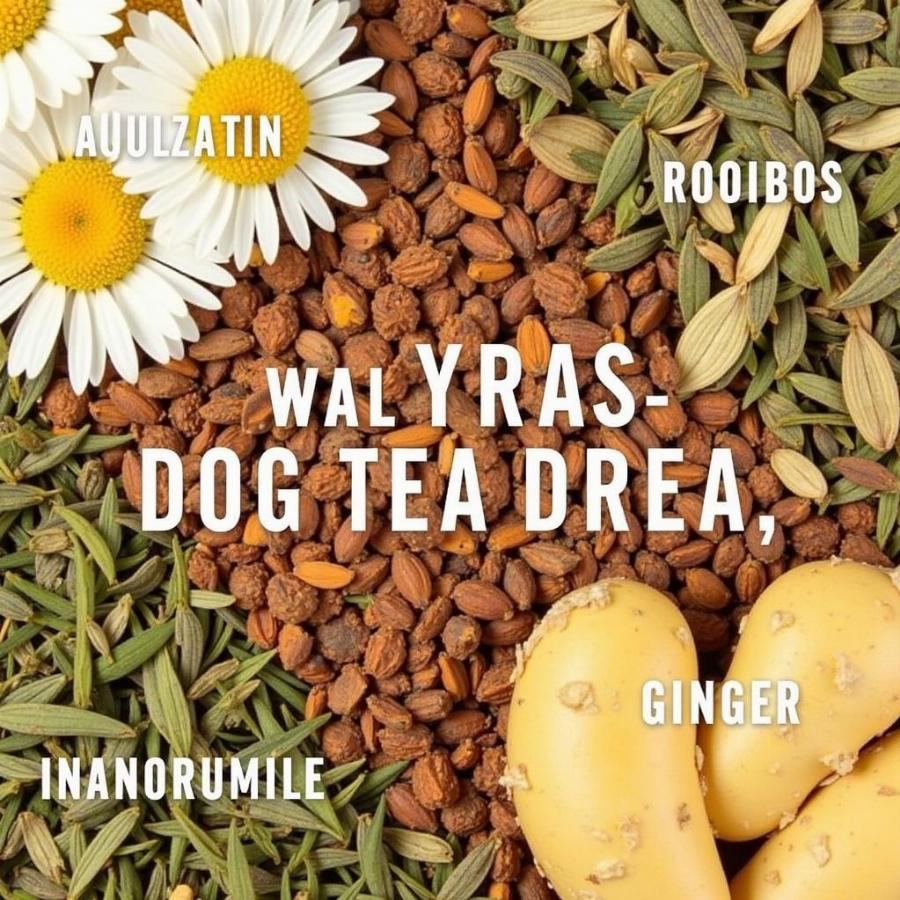Tea is a common beverage for humans, offering various health benefits. But what about our canine companions? Can dogs drink tea? The simple answer isn’t a straightforward yes or no. While certain types of tea can offer potential health benefits for dogs, many are harmful and should be avoided entirely. Understanding the nuances of tea and its effects on dogs is crucial for responsible pet ownership. This article delves into the complexities of tea consumption for dogs, outlining the safe and unsafe varieties, potential benefits, risks, and essential precautions.
Can Dogs Safely Drink Tea?
Not all teas are created equal, and what might be a soothing beverage for us could be detrimental to our furry friends. The primary concern with tea for dogs is the caffeine content. Caffeine, a stimulant found in many teas, can be toxic to dogs, causing various adverse effects, ranging from mild restlessness to severe cardiac complications. Therefore, caffeinated teas like black tea, green tea, and white tea should be strictly avoided. Even decaffeinated versions of these teas may contain trace amounts of caffeine, which could still be harmful, especially for smaller dogs or those with underlying health issues.
However, certain herbal teas, like chamomile and rooibos, are generally considered safe for dogs in moderation. These caffeine-free options offer potential health benefits, but it’s crucial to consult with your veterinarian before introducing any new food or drink into your dog’s diet. They can assess your dog’s individual health needs and recommend appropriate serving sizes and frequency.
Benefits and Risks of Herbal Tea for Dogs
Some herbal teas, when given appropriately, might offer certain benefits for dogs. For instance, chamomile tea is known for its calming properties and can help soothe an anxious dog or alleviate digestive upset. Rooibos tea, rich in antioxidants, may support the immune system.  Trà thảo mộc cho chó However, it’s crucial to remember that these benefits are not scientifically proven in dogs and should not replace veterinary care.
Trà thảo mộc cho chó However, it’s crucial to remember that these benefits are not scientifically proven in dogs and should not replace veterinary care.
On the other hand, even herbal teas can pose risks if given incorrectly. Some herbs can be toxic to dogs, and even safe herbs can cause problems if consumed in large quantities. Always research the specific herbs in a tea before giving it to your dog, and start with very small amounts to monitor for any adverse reactions.
What to Do If Your Dog Drinks Tea
If your dog accidentally ingests a large amount of caffeinated tea, seek immediate veterinary attention. Signs of caffeine toxicity in dogs include restlessness, panting, increased heart rate, tremors, vomiting, and diarrhea. Quick action can be life-saving. For small amounts of herbal tea, monitor your dog for any unusual behavior. If you notice any changes, consult your veterinarian.
Choosing Safe Teas for Your Dog
If you’re considering giving your dog herbal tea, choose high-quality, organic teas specifically formulated for pets. Avoid teas with added sugars, artificial flavors, or preservatives. essiac tea for dogs offers insights into a specific herbal blend. You might also find chamomile tea for dogs helpful for understanding its potential benefits. Always consult your veterinarian before introducing any new food or drink, including tea, into your dog’s diet.
What if My Dog Doesn’t Like Water?
Sometimes, dogs can be picky about drinking plain water. If your dog isn’t drinking enough water, you can try adding a small amount of dog-safe, unsweetened broth to their water bowl to make it more appealing. However, don’t use tea as a substitute for water. Dehydration can be serious, so if your dog consistently refuses to drink water, consult your veterinarian. spraying dog with water could offer some fun ways to encourage hydration. You could also learn about alternative solutions in is hydrogen peroxide okay for dogs if you’re exploring other options for your pet’s health. Remember, proper hydration is essential for a dog’s overall well-being.
Conclusion
While the idea of sharing a cup of tea with your furry friend might seem appealing, it’s important to prioritize their safety. Most teas, especially those containing caffeine, are unsuitable for dogs and can pose significant health risks. Certain herbal teas might offer potential benefits, but always consult your veterinarian before giving any tea to your dog. Water remains the best and most important source of hydration for dogs. do dogs drink tea? Yes, they can, but only specific kinds and under careful supervision.
FAQ
- Can I give my dog iced tea? No, iced tea often contains high levels of caffeine and sugar, both of which are harmful to dogs.
- What are the signs of caffeine toxicity in dogs? Restlessness, panting, increased heart rate, tremors, vomiting, and diarrhea are common signs.
- Are there any benefits to giving my dog herbal tea? Some herbal teas may offer calming or antioxidant benefits, but this is not scientifically proven in dogs.
- What should I do if my dog accidentally drinks caffeinated tea? Contact your veterinarian immediately.
- Can I use tea as a substitute for water for my dog? No, water is the best source of hydration for dogs. Tea should never replace water.
- Can puppies drink tea? No, puppies are even more susceptible to the negative effects of caffeine and certain herbs.
- Where can I find reliable information about safe herbal teas for dogs? Consult with your veterinarian for personalized recommendations.
Beaut Dogs is your trusted source for all things related to dog care. We provide reliable and in-depth information to help you navigate the world of dog ownership. If you need further assistance, please contact us at Email: [email protected]. We are here to help! french female dog names might interest you if you’re looking for name inspiration.